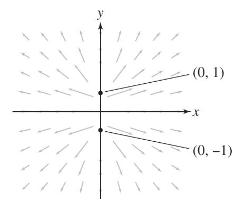Question: Figure 6 shows the vector field (mathbf{F}=abla f), where [ f(x, y)=ln left(x^{2}+(y-1)^{2}ight)+ln left(x^{2}+(y+1)^{2}ight) ] which is the velocity field for the flow of a
Figure 6 shows the vector field \(\mathbf{F}=abla f\), where
\[
f(x, y)=\ln \left(x^{2}+(y-1)^{2}ight)+\ln \left(x^{2}+(y+1)^{2}ight)
\]
which is the velocity field for the flow of a fluid with sources of equal strength at \((0, \pm 1)\) (note that \(f\) is undefined at these two points). Show that \(\mathbf{F}\) is both irrotational and incompressible-that is, \(\operatorname{curl}_{z}(\mathbf{F})=0\) and \(\operatorname{div}(\mathbf{F})=0\) [in computing \(\operatorname{div}(\mathbf{F})\), treat \(\mathbf{F}\) as a vector field in \(\mathbf{R}^{3}\) with a zero \(z\)-component]. Is it necessary to \(\operatorname{compute}_{\operatorname{curl}_{z}(\mathbf{F}) \text { to conclude that it is zero? }}\)

1 - (0, 1) (0, -1)
Step by Step Solution
3.41 Rating (179 Votes )
There are 3 Steps involved in it
To address your question we need to show that the vector field mathbfF abla f is both irrotational and incompressible The vector field mathbfF is give... View full answer

Get step-by-step solutions from verified subject matter experts


